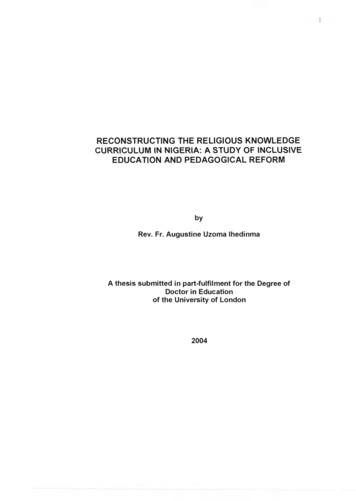Search religious cognitive behavioral therapy
A) Introduction to Islamic Integrated Cognitive Behavioral Therapy (IICBT) Islamic Integrated Cognitive Behavioral Therapy is an adaptation of the Religiously Integrated Cognitive Behavioral Therapy (Islamic version), a manualiz
indicated that the most effective interventions are those that use cognitive-behavioral techniques to improve mental functioning. Cognitive-behavioral treatments have become a dominant therapy in clinical psychology, and analyses of cognitive-behavioral programs for offenders have come to positive conclusions. Chapter 2: What is Cognitive .
Cognitive science and the Conceptual foundations of Cognitive-behavioral therapy: viva la evolution! 74 Rick E. Ingram and Greg J. Siegle chaPTEr 4. Cognitive-behavioral therapy and psychotherapy integration 94 T. Mark Harwood, Larry E. Beutler, and Mylea Charvat ParT ii. aSSESSmEnT conSidEraTionS chaPTEr 5. Cognitive assessment: issues and .
Cognitive Behavioral Therapy for Chronic Pain Among Veterans. Introduction. What is Cognitive Behavioral Therapy for Chronic Pain? Cognitive Behavioral Therapy (CBT) is a widely researched, time-limited psychotherapeutic approach that has been shown . to be efficacious across a number of mental and behavioral conditions.
cognitive therapy techniques. In this case, a behavioral technique such as deep breathing may be easier to implement, which may help to calm and focus thinking. 1This is also referred to as Cognitive–Behavior Therapy, which gives the behavioral components of CBT more emphasis. Another known term is Cognitive–Behavioral Treatment.
1.6.1 A religious knowledge curriculum 26 1.6.2 A religious studies curriculum 27 1.6.3 A religious education curriculum 27 1.7 Religious knowledge and the national curriculum 29 1.8 Religious knowledge and the humanities 31 1.9 Conclusion 35 CHAPTER TWO: REVIEW OF THE RELIGIOUS KNOWLEDGE CURRICULUM IN NIGERIA 36 2.1 The development of the religious knowledge curriculum in 36 2.1.1 The .
Tx Session #4: Review, titrate, cognitive therapy I Tx Session #5: Review, titrate, cognitive therapy II Tx Session #6: Review, titrate, insomnia relapse prevention CBT-I is typically 4 to 8 weekly treatment sessions (Perlis et al. Cognitive Behavioral Treatment of Insomnia: A Session-by-Session Guide. 2005)
An analysis of programs and practices in CrimeSolutions.gov finds that cognitive behavioral therapy can deter crime, assist victims and prevent recidivism. P erhaps no other intervention has attracted more attention across the criminal justice system than cognitive behavioral therapy (CBT). First widely used in the latter half of the 20th
Keywords: mindfulness, mindfulness-based cognitive therapy, stress, college counselors, nursing, single-subject experimental design Mindfulness-based cognitive therapy (MBCT) has been described as part of a third generation of cognitive therapies (Harrington & Pickles, 2009). Along with dialectical behavioral therapy and others like it, MBCT has
It describes Cognitive-Behavioral Coping Skills Therapy (CBT), one of three treatment approaches studied in Project MATCH. Thera-pist manuals for the other treatments-Twelve-Step Facilitation Therapy (TSF) and Motivational Enhancement Therapy (MET)-- are available in volumes 1and 2 of this series, respectively. Rationale for Patient-Treatment
Occupational Therapy Occupational Therapy Information 29 Occupational Therapy Programs 30 Occupational Therapy Articulation Agreements 31 Occupational Therapy Prerequisites 33 Physical Therapy Physical Therapy Information 35 Physical Therapy Programs and Prerequisites 36 Physical Therapy Articulation Agreements 37 Physical Therapy vs .
Cognitive Behavioral Therapy With Religious and Spiritual Clients: A Critical Perspective Kathryn M. Carlson and A. Antonio González-Prendes School of Social Work, Wayne State University, Detroit, Michigan, USA ABSTRACT Religion and spirituality (R/S) are important factors in the lives of many individuals. Yet, R/S and their impact on mental .











